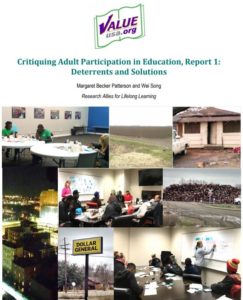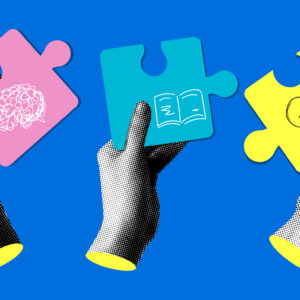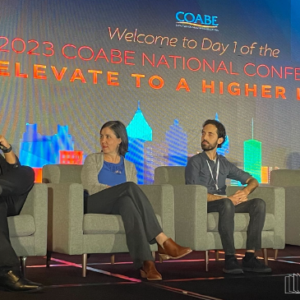Many of you have probably seen by now the first report from the Critiquing Adult Participation in Education project (CAPE) on Deterrents and Solutions. The need to leverage technology to provide alternative, flexible, anytime, anywhere, personalized solutions was highlighted throughout the report as critical for bringing effective learning opportunities to the 90% of US adults who need basic skills but don’t participate in the adult education system.
Learners proposed educational technologies as an important way to overcome deterrents to participation in adult education (e.g. lack of childcare, transportation, flexible scheduling, etc.). Page 13 of the report in particular has some important additional insights for the ed tech field. Learners expressed interest in learning more about computers, the internet, and social media. One interviewee even called Google “the new adult education” while many others shared how they used YouTube or the internet to teach themselves new things.
While some learners are already independent learners or consumers of technology, the study also found that many participants emphasized the need for more one-on-one guidance when giving instruction via technology. One women was quoted as saying: “Don’t put me on the computer alone.”
Here at the EdTech Center, we are committed to innovating to address this national need. We are researching, developing, and piloting scalable innovative models for providing learners anytime, anywhere learning with mlearning pilots such as Mobile Up as well as with flexible models for personalized drop-in supports that help learners with new technology skills or when leveraging technology to learn other subjects. In our chart and webinar, “Range of Models for Digital and Blended Learning”, we have shared some innovative new digital learning models ranging from virtual mobile coaches supporting online learners by cellphone to peer learning circles that meet once a week.
The report also shares the challenges learners face with having smartphones and access to high speed internet, especially in rural areas. This is an important call to action for the adult education community to continue our efforts to increase broadband Internet access and affordability. Technology can provide anytime, anywhere learning opportunities that remove traditional barriers to participation in adult education, but this report also shows how much more innovation and advocacy is needed to make sure all adults have access to learning new skills and the supports they need to succeed.
Critiquing Adult Participation in Education, Report 1: Deterrents and Solutions by Margaret Becker Patterson and Wei Song, Research Allies for Lifelong Learning, ValueUSA.org. May, 2018.
Alison Ascher Webber develops and leads innovative projects for the EdTech Center, including advising the new Employment Technology Fund and leading its field testing. She also manages the Mobile Up! Project bringing mobile learning and career coaching to low-wage immigrant service workers.






4 Comments. Leave new
My adult students do not have the funds to purchase computers, much less high speed internet. I have repeatedly approached a local agency that purports to give computers to adult students, but they have failed to respond.
Kudos for your efforts. I agree computers are critical for going the next step with digital literacy and learning online. And in the short-term, we can do a lot with smartphones. Building Skills Partnership (buildingskills.org) in California offers smartphone training workshops on weekends to help low-wage, immigrant service workers learn to use internet, email, apps, and learning programs on their phones. It’s a powerful springboard for them. The next step is helping them then get on computers. Alison
I completely agree that there is a need for more one-on-one guidance when giving instruction via technology. Frontloading blended learning classes with in-person orientations and hands-on practice have been anecdotally reported to improve outcomes by many adult education practitioners in California.
Agreed Branka! And we saw in our mlearning pilots in CA like Mobile Up and nationally that students who have upfront orientation to practice how to use the mlearning program/app showed greater completion and retention.